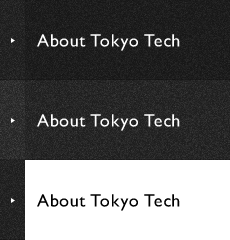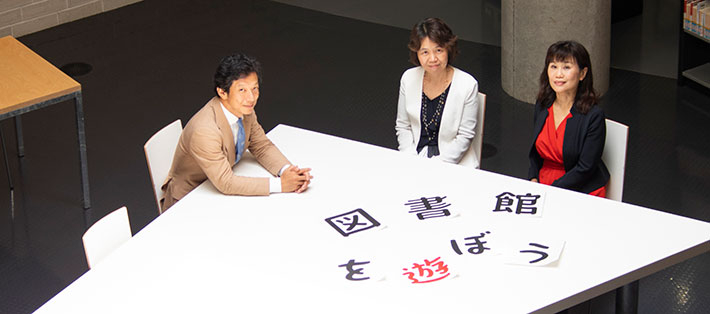
Welcome to the Tokyo Institute of Technology Library! It opened anew in July 2011 at its present location on the Ookayama campus. Nicknamed "Cheesecake" by the students for its unique design, the building was designed by Professor Koichi Yasuda (at the School of Environment and Society) and honored with the 2011 Good Design award in Japan. The library houses approx. 630,000 books as of 2017.
(at the School of Environment and Society) and honored with the 2011 Good Design award in Japan. The library houses approx. 630,000 books as of 2017.
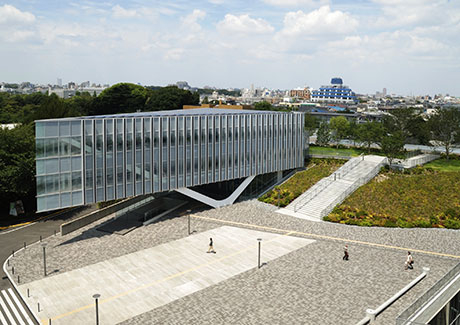
Indeed, the benefit of the Internet is enormous. You can quickly get what you want online, while conventional paper-based media such as newspapers, magazines, and books seem to dwindle in size and use. But even if that is the case, there is all the more reason for actively making use of the library, a vast stock of paper-based books and other resources. Then, how can students do all this?
Professor Hiroichi Yanase (Media Studies, Institute for Liberal Arts) interviews Professor Kyoko Yamamuro
(Media Studies, Institute for Liberal Arts) interviews Professor Kyoko Yamamuro (School of Engineering),the Director, and Riko Modeki, the Head of the Library Division.
(School of Engineering),the Director, and Riko Modeki, the Head of the Library Division.
Held on July 11, 2018 at the Ookayama Campus Library
- *
-
This article and photos have been prepared with the assistance of Tokyo Tech students.
"The library was our cradle!"
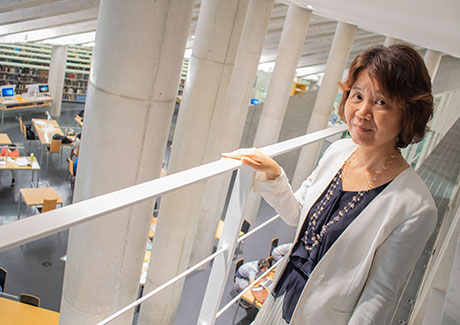
Professor Kyoko Yamamuro
Yanase:Please introduce yourself and let us know what the library means to you.
Yamamuro:My field is Japanese History. I have been teaching historiography and economic history since 1993 (as Assistant Professor then) at Tokyo Tech. I assumed the curatorship in April 2017. As a researcher, the library has never been far from my life, because a historian's life always involves strenuously grappling with oceans of reference materials. My research career started at the historical records gallery of the University of Tokyo. I used to be secluded all day long in the archives.
Modeki:I have engaged in the management of various university libraries since graduating from a university dedicated to library and information science. My first workplace was a small, so-called "one-person library" at the University of Tokyo, and later I worked at the General Library in the same university. Then, after working at several schools such as Ochanomizu University and Tokyo University of Foreign Studies, I landed here at the Tokyo Institute of Technology Library in April 2017, at the same time as Professor Yamamuro.
Yanase:What are the highlights of your efforts at the Tokyo Tech Library, as university library management professionals?
Yamamuro&Modeki:It's "how to promote the active participation of Tokyo Tech students in library management."
Many more ways to enjoy the library!
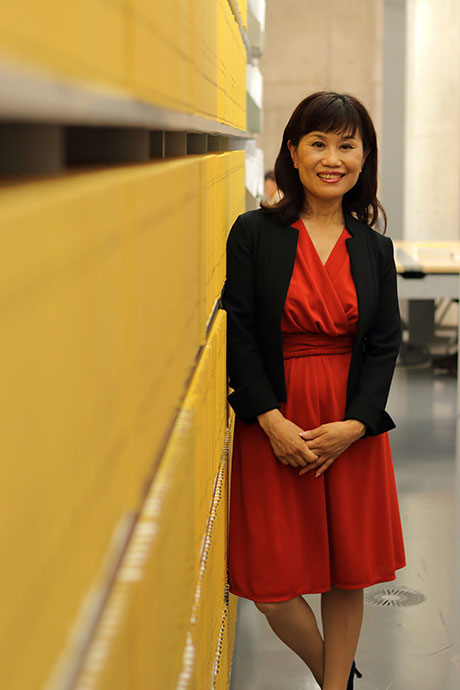
Riko Modeki, the Head of the Library Division
Yamamuro:Since before becoming curator, I had been wrestling with this question: how can we improve the university library today? Then, one day I came up with this idea: there is very little interaction between the library and students.
The relationship between teachers and students is close and active, based on contacts through classes and seminar activities. Compared with that, the interaction between the library and students is limited to over-the-counter transactions of borrowing and returning books.
But that can be changed, and the library could use more student engagement. That was my resolve from the very start. I started a new system where students could actively take part in library operation through diverse projects, while librarians could come to profoundly understand how students think. It's a "student-librarian collaboration" scheme aiming to explore the library's potential.
Yanase:How has student involvement in library operation been so far? Has there been any at all?
Yamamuro:Actually, there has. We have something called the "Library Supporter" system, and volunteer students take charge of our library back-office operation, including book borrowing/return registration, bookshelf arrangement, book labeling and conducting guided tours of the facility. Their help is wide-ranging and indispensable, but I must say it still remains at an auxiliary level. My goal was much higher than that, something to encourage their initiatives in exploiting the library.
Modeki:It's beyond "collaboration." It's rather based on "engagement" between the library and students, which leads to creating a new movement.
Students launching a riddle-solving game at the library
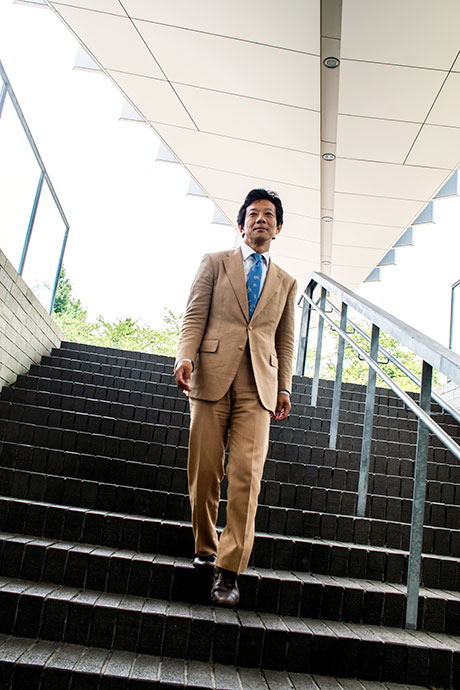
Professor Hiroichi Yanase
Yanase:Could you tell us what project the "collaboration" between the library and students specifically started?
Yamamuro:Last summer we gathered a dozen volunteer students to develop and operate a "riddle-solving game." The team actually devised a "real-world" game, where participants must solve "riddles" hidden at various locations in the library to reach the goal while pursuing their original stories.
Since October 2017, this "riddle-solving" game has been performed five times. We were concerned about the number of participants in the beginning. But it turned out to be large, including not only students but also families in the neighborhood, whose children were running about looking for the book in question, while their moms and dads were focusing on riddles. Seeing families having fun together just made me smile.
This April, the team also performed this game for the new entrant welcome event, with a new scenario. Riddle-solving is an experience-based game and very useful for new entrants to become "familiarized with the new environment." A team-specific riddle-solving activity can help them make friends and become well-acquainted with the library. Riddle-solving at the library was initially triggered by the idea of letting new students learn about the facilities as well as the diversity of its library collections.
Modeki:The library should be, by its nature, free and open. So, holding an active event like this is a good idea. Of course, the library should provide a quiet atmosphere conducive to concentration, but it's true the facilities are equipped with a space for vigorous discussion. Why not boost our event-driven practice to expand the potential of the library?
Yamamuro:We even started to use venues "outside" the library and launched the project "The Book Changed Your Life" since this spring, in which library supporters interview Tokyo Tech teachers.
Amazing things about the Tokyo Tech library
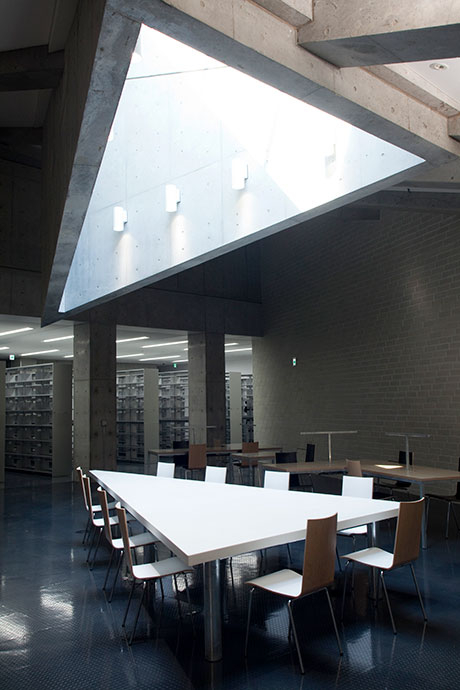
Yanase:What attract you about the Tokyo Tech library?
Modeki:Let me start with its unique architecture, designed by Professor Yasuda. Talking about university libraries, they are usually confined in old-style buildings. But ours is different. To reach the main library floor, you need to go underground. Between the Ookayama campus entrance and the wooden deck in front of the main building, there is a walking space. The library is located exactly beneath that area, and that means students walk above the library every day.
By the way, there is the phrase "Standing on the shoulders of giants." Just like this maxim says, new knowledge and wisdom always stand on the accumulation of the old, and that's what the library is all about. Our architecture marvelously reflects this idea not only conceptually but also physically. Tokyo Tech students stand on the shoulders of giants, namely the library, which is built underground, to dive in and explore the realm of intellect.
Yamamuro:I've heard students saying, "entering the library is like going down into a dungeon, and that makes you tense." They may feel the sense of suspense that a monster might be waiting at the end of downward stairs.
That's because the entire library looks like a labyrinth, with neatly-organized bookshelf blocks and paths threading among them. Descending stairs, you can't see what's beyond the entrance ahead. You don't know what's inside until you go down the stairs, turn to the right and go inside. I hope students make the most of this exciting "dungeon" and enjoy "treasure hunting" for stimulating encounters with books.
Modeki:To sum up, the Tokyo Tech library is packed with various contrasting elements, such as a "wisdom base" built over the years, a fancy "cheesecake" top design on the ground, "maze-like underground floors," and bustling riddle-solving games held in a quiet environment.
Yanase:What about the library's collection?
Yamamuro:As a science and technology university, our collection focuses on related fields. There are complete sets of essential materials especially for natural science and engineering studies. A significant number of Tokyo Tech students will become researchers after graduation, and they can exploit the great assemblage of academic resources our library can provide.
Modeki:It's diverse, to say nothing of a large number of electronic journals required for a university like ours. Actually, we are placed among the top few as a university with collections of conference proceedings and technical papers.
Yamamuro:Another great thing is that the library is open to researchers outside the university. Tokyo Tech graduates as well as non-related researchers can access the library's top-class materials base, through appropriate procedure.
Modeki:Yes, it's unusual, considering university libraries are often "closed" to the general society. But we think "wisdom" bases accumulated by universities should be open to society, and that's why our library is open to any researcher.
Enjoy "intellectual play" at the library!
Yanase:How do you want Tokyo Tech students to use this library?
Yamamuro:My recommendation is to have more fun at the library. Of course, I mean "intellectual fun." Finding your books, drawing out hidden wisdom, discussing things with friends, and absorbing yourselves in your academic pursuit... a library is a perfect place for letting your intellect "play." I really want to see students find and invent their unique ways of intellectually enjoying the library.
Yanase:Talking about "intellectual fun," young people nowadays are ready and quick to go online. How can we raise awareness of the merits of actively using the library in this Internet age?
Yamamuro: I don't deny the benefit of the Internet. It's efficient and cost-effective. Smart search can cut short your troubles and instantly bring you the information you want. Your homework reports can be done quickly and efficiently by patchworking online contents without physically going to the library.
But economizing on time and effort can also reduce your "pleasure." Instead, making detours, doing hard brainwork, and picking up extra peripheral knowledge can really deepen your learning. That's how you can "please your intellect." A cost-effective method can't do that. But the library can.
The library is not as efficient as the Internet when it comes to getting what you want quickly. But it can be your intellectual "treasure trove," once you find your own way to use it. So, I want students to enjoy various "detours" the library can give!
Modeki:Talking about myself, especially after engaging in a library job for a long time, I have this overwhelming feeling that "I can learn much, much more!" Huge mountains of books in the library still make me feel small, and there's much more to learn. I think this feeling is something would-be researchers can use.
Yamamuro:Yes, she's right. I feel so "small" in the library. It's like when you are alone surrounded by great nature. That's the thrilling part of the library, and I feel so perhaps because of this physical existence of so many books. I really want students to grasp the library's world of wisdom not only through their brains but also their five senses.
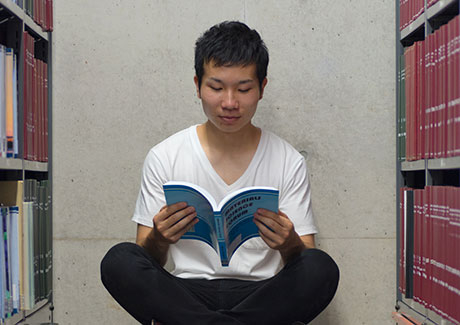
Written by Hikaru Seki,
1st year master's student
in Civil and Environmental Engineering,
School of Environment and Society
Meet Our Library Supporter
The fun part of being a library supporter: Say ‘hi’ to a discovery that's far beyond your limit!
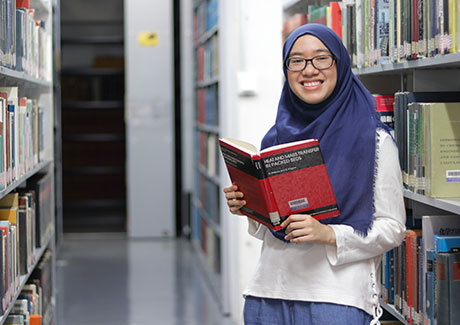
Shofiyah Sakinah,
1st year master's student in Chemical Science and Engineering,
School of Materials and Chemical Technology.
I'm Shofiyah Sakinah from Indonesia. I was admitted to Tokyo Tech in 2016 from a college of technology in Fukushima Prefecture (during the third year of the bachelor's course). It's been eighteen months since I started working as a "library supporter." My job specifications include arranging and labeling of newly-arrived books, organizing bookshelves and performing circulation desk procedures for borrowing and returning books. To be honest, I easily get exhausted handling thick and heavy books, but I love books so much!
Since I was small, reading books has been a major source of fascination to me. I was caught in the thrill of mystery novels such as those of Agatha Christie. My high school library was such a wonderland I even wished I could move in and live there; I could access any kinds of books, use the PC and Internet, and also watch movies for free! But unfortunately, there was no such system like "library supporters" in my high school in Indonesia. So, when I found one here in Tokyo Tech, nothing could stop me from applying.
Arranging books in order, you will be amazed to see so many "unknown books" beyond your comprehension. Old academic journals, papers and conference proceedings will tell you how knowledge and wisdom bases have been handed down from generation to generation. It's awe-inspiring.
Some people say you don't need books anymore, because you can use the Internet to search for information. But you shouldn't forget that the Internet only brings you answers to questions your limited knowledge leads you to ask. Nothing less, nothing more. But if you pick up a book at the library and open it, an unknown world unfolds and pulls you inside.
So, my dear Tokyo Tech fellow students, why don't you enjoy the library more? I believe the first step in doing so is to become a library supporter!
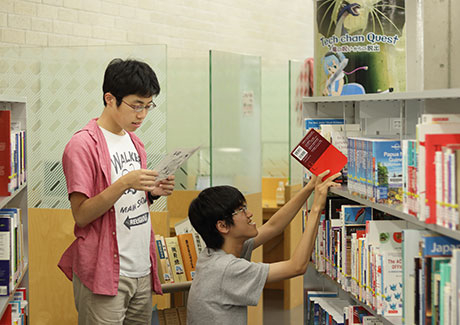
Members of the riddle team hiding "riddles"
— Here are some comments from the members.
- What's shocking?: Young moms and elementary school students smoothly solving riddles, while Tokyo Tech students are struggling over them. Give them a break!
- What's rewarding?: The moment my friends finally solved a riddle after so much bother and strain, and of course, when I hear people say they have had fun!
- For the future?: Enhance the awareness of the event throughout the campus.
The riddle team is currently working hard on the new sequel "Tech-chan Quest II" for the Tokyo Tech Festival 2018.
Any researcher has their own story. Aiming to spotlight such personal stories of life through "books," this new project starts this autumn. Our library supporters will visit teachers at their labs for an interview, and we have already collected wonderful accounts from Professor Hidetoshi Nishimori at the quantum computer lab and Professor Koichi Yasuda
at the quantum computer lab and Professor Koichi Yasuda , designer of the cheesecake architecture, who were inspired by Yukio Mishima and Arata Isozaki, respectively. Which lab should our interviewers visit now? Who will be the next professor ready to become an inspiration for Tokyo Tech students?
, designer of the cheesecake architecture, who were inspired by Yukio Mishima and Arata Isozaki, respectively. Which lab should our interviewers visit now? Who will be the next professor ready to become an inspiration for Tokyo Tech students?
Photo by Photography Club:
Mei Fukuda, 3rd year in Mathematical and Computing Science, School of Computing
Shinnichi Takagi, 2nd year in Mechanical Engineering, School of Engineering
Haruka Takai, 2nd year in Mathematics, School of Science
Kazuki Omodaka, 2nd year in Computer Science, School of Computing
The Special Topics component of the Tokyo Tech Website shines a spotlight on recent developments in research and education, achievements of its community members, and special events and news from the Institute.
Past features can be viewed in the Special Topics Gallery.
Published: September 2018
. Any information published on this site will be valid in relation to Science Tokyo.












